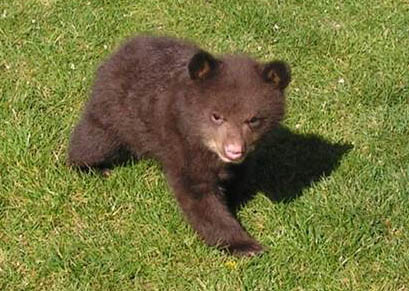First, we need to get the bear into rehab...

Since 1989, IBBR has continued to speak out and try to help all bears in need. This is in addition, to the over 200 bears that have passed through our rehab program. And, we’re still speaking out!
Just last weekend, IBBR received a call about two orphan cubs whose mother had been shot by a hunter. Idaho Fish and Game contacted us and wanted to know if we could take them into our rehab program.
Of course, we said “Yes!” We said we were ready to receive them and help (if needed) assist in transporting them to IBBR immediately.
Idaho Fish and Game agreed and said they would let the cubs come to IBBR, if we agreed to transfer them to another facility when they were “weaned.” We were told that “weaning” is generally around June 15th as that’s when “most cubs are weaned in the wild.” The reason for transfer was explained that they needed to be at a facility “where there is less exposure to people.”
IBBR has always taken the position that the needs of individual bears will be assessed, individually. We do not apply a blanket approach to the needs or assessments of bears in our rehab program. We also consider our organization responsible for the welfare of our rehab bears – until those bears are successfully released and living wild and free once again. And, we hold ourselves accountable for that welfare to the state wildlife agency, our supporters, and the general public. In other words, transfers are stressful to wild animals and we do not lightly transfer our rehab charges, and only consider transfers when it is in the best interest of the bears, and this is not.
We shared our policies with the official with Idaho Fish and Game, and our concerns that we would not accept an arbitrary assessment of “weaning”, and that transferring cubs to another facility in the middle of rehab was not in the best interests of most cubs. In addition, our facility is well suited to care for bears during the entire rehab process until release.
Based on data recovered over the past twenty-five (25) years, bears rehabbed at IBBR facilities, have documented survival rates up to six (6) years post release. Radio collar tracking and post-mortem retrieval of ear tags document that few IBBR bears, less than 2%, have become involved in human-bear conflicts situations within 1 year post release (this is how most agencies classify success). Most bears, over 96%, are successfully released. Thus, there is no scientific basis for disrupting the rehab care of IBBR bears.
As a general rule, behavior-based bear husbandry is the care of bears according to their genetic expectations which creates a low stress environment that enables the bears to thrive mentally and physically. Bear cubs have a genetic expectation to be raised by a parent in a known environment. They suffer trauma at the loss of the parent and change of environment from the wild to rehabilitator. The rehabilitator's job is to lower stress levels by setting up a stable complex environment that allows the bear cub to develop mentally and physically. Moving the bear cub yet again to a second rehabilitator and environment causes additional [and unnecessary] trauma and stress during a period of active brain growth and further jeopardizes welfare.
Rehabilitation facilities differ widely in their construction and we have learned a great deal about this over the past 2 ½ decades. On occasion, Idaho Fish and Game has mentioned they prefer natural enclosures filled with trees. While this sounds wonderful, it complicates the rehab process for several reasons because rehabilitators are unable to: (1) document escapes because there are no roofs on the enclosures; (2) monitor the health of bears within the enclosure using appropriate cameras; (3) monitor if individual bears are eating properly; (4) monitor injuries that result from falling from trees; and (5) easily capture bears when agencies pick them up for release. IBBR made it clear to Idaho Fish and Game that we expect that the “weaned” status of any cub will be individually assessed, and, that we will not agree to transfer any cub to any facility that has been known to have these problems.
It became apparent during our conversations, that the agency did not appear to be willing to let us put the needs and welfare of these cubs first… Since the call first came to us, it has been 5 days, and although we have been ready, willing, and able to receive these two orphans, and to care for them until they are successfully released back into the wild, we have not received a call back. We asked the agency if the cubs were in their possession and they indicated that they were, and were being “held” while the agency decided where to send them. We then shared our concerns about the cubs not getting placed into rehab immediately, as opposed to being “held” in an inappropriate setting.
So, while we wait to hear about the fate of these cubs, we need you to know that YOUR SUPPORT helps us continue to advocate for bears in need… to advocate for consistent ethical and science-based practices for rehabilitation programs…to educate those living and recreating in bear habitat to embrace practices that will hopefully avoid injury and orphan states of bears…to make change in the operations of some wildlife agencies so that differing ideas in policies won’t impede the effectiveness of black bear rehabilitation. Ethical and science-based protocols for rehabilitation must be incorporated into regulations and management plans. Consistent standards need to be developed to define human-bear conflict activity with appropriate responses. Agencies should integrate the fluid nature and adaptive needs of rehabilitation when drafting policies and procedures. And, black bear rehabilitators, like IBBR, should contribute to black bear management policies as they affect black bear rehabilitation.
- Idaho Black Bear Rehab, Inc. (IBBR)



